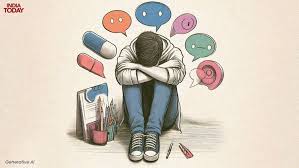The invisible battle for mental health in India
Mental health remains an afterthought in our healthcare narrative. The true healing encompasses both body and mind
As a psychologist, I’ve seen how health in India isn’t just a battle of the body—it’s a struggle of the mind. Behind every disease is a person dealing with fear, frustration and, at times, loneliness. Whether in rural areas, where diseases like tuberculosis persist or in urban centres where lifestyle illnesses are on the rise, the emotional toll is often invisible but deeply felt.
In rural India, patients face challenges that go beyond medical diagnoses. I remember a man from a small village battling tuberculosis, but what weighed on him most wasn’t just his illness—it was the isolation. He felt forgotten and cut off from the world because healthcare facilities were far away, and his family didn’t know how to support him. This emotional isolation is something many rural patients experience, and it can be as damaging as their physical symptoms, compounding their sense of hopelessness. In cities like Gurgaon, the struggles are different but equally profound. I think of Anjali, a young woman overwhelmed by anxiety.
To the outside world, she seemed to have it all—a great job, a busy social life, and a bright future. But inside, she was spiralling. She hesitated for months before seeking help, afraid that admitting to her struggles would make her appear weak. This fear of judgment keeps many people from asking for help, and it’s heartbreaking to see how common this is in urban environments. Mental health remains an afterthought in our healthcare system.
We focus on physical symptoms—treating heart disease, diabetes, and other conditions—but the emotional weight people carry is often ignored. I’ve seen people suffer for years in silence, feeling their emotional pain isn’t valid because it can’t be measured like a physical illness. There’s an urgent need for change. India’s healthcare system mirrors this divide. In cities, private care offers options, but mental health services are still limited and expensive.
In rural areas, mental health is rarely even discussed. Socioeconomic barriers, especially for women, make it even harder to access mental health care. Women often put their health—both emotional and physical—on the back burner, prioritising their families’ needs over their own. One of my patients, a mother of two, delayed seeking help for her anxiety for years. She was exhausted, overwhelmed, and losing her sense of self. But like so many women, she felt guilty for even considering that her health deserved attention.
This is a common story—too many women in India silently endure mental health struggles, dismissing their needs as unimportant, further isolating themselves in the process.
We need to change this narrative. Mental health is not a luxury or a sign of weakness. It is an integral part of overall well-being. We must make mental health care as important as physical health in our conversations and our healthcare system. Only then can we address the full scope of health challenges in India—because real healing isn’t just about the body; it’s about the mind too
